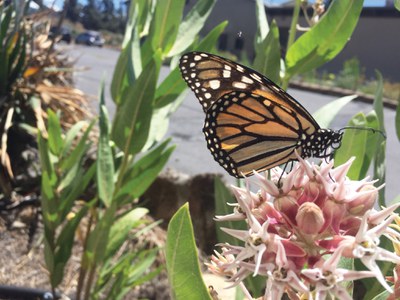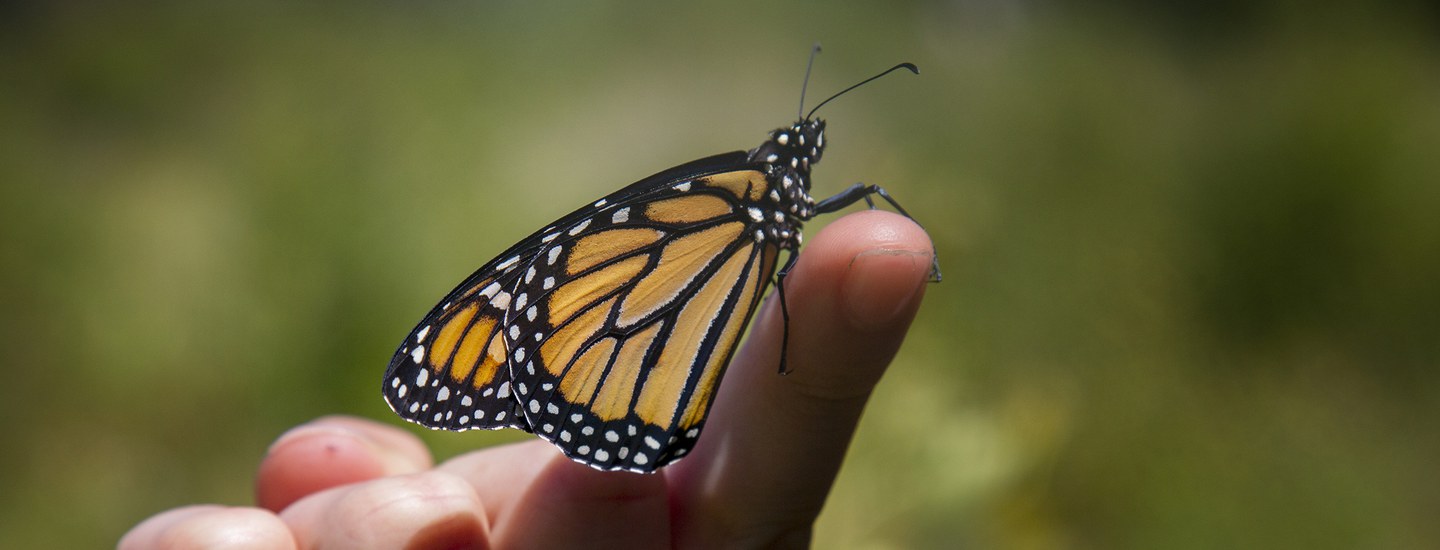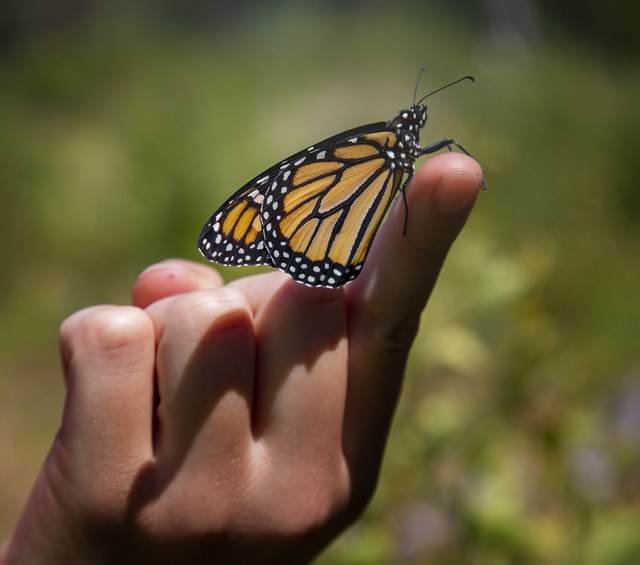Why do monarch butterflies need our help?
The iconic Western monarch butterfly is in severe decline. As recently as the 1990's, more than 1 million monarchs were recorded overwintering in southern California. In the winter of 2017-18, around 150,000 monarchs were counted. In the winter of 2018-2019, a startling 20,456 monarchs were recorded. Why are their populations dwindling so drastically?
Habitat loss is a big factor in monarch population declines. Monarchs are directly linked to milkweed plants. Female monarch butterflies lay their eggs ONLY on milkweed leaves; if there is no milkweed around when they are ready to lay eggs, they simply won't lay eggs. Milkweed is also the only food that monarch caterpillars eat on their way to transforming into a butterfly. Of all the plants from which monarchs sip nectar as adult butterflies, milkweed makes up about 1/3 of their food. Milkweed is absolutely critical to monarchs, from egg to caterpillar to adult butterfly. Without milkweed available, monarchs simply cannot survive. In Central Oregon, we have two types of native milkweed--showy and narrowleaf. Narrowleaf has been almost completely removed from our area, and showy milkweed is found in limited numbers.
Another factor in monarch population decline is harmful pesticides, including neonicotinoids. All pollinators are struggling to a certain extent because of the pesticides that are sprayed and then ingested by pollinators when drinking nectar.
Climate change is also a struggle for the specialized monarch. Changes in weather means larger storms during the winter in southern California, affecting their survival. Increased carbon dioxide in the atmosphere is also changing a compound found in milkweed, which could mean that the milkweed of the future is inedible to monarchs.

What is the Deschutes Land Trust doing to help protect and conserve monarch butterflies?
The Land Trust is working to help monarchs survive! The most important thing we are currently doing for monarchs is restoring habitat. Western monarchs need habitat for all stages of their life. Their habitats need to be free from pesticides and be located where native milkweed and other native pollinator-friendly plants thrive. It also needs to have space for monarchs to fly freely, as well as be able to seek shelter when needed. The Land Trust works hard to protect these types of habitats and restore them, so these areas can support monarchs and other pollinators now and into the future. In addition, the Land Trust works collaboratively across state lines, hoping to conserve and restore habitat along monarch migration routes and to educate communities along these routes.
What can I do to help protect and conserve monarch butterflies?
We're so glad you asked! Since restoring Western monarch butterfly habitat is of the utmost importance, we're asking for your help with it! What that looks like:
- Plant native milkweed! Central Oregon has two types of native milkweed--narrowleaf and showy. Native milkweed is adapted to our climate, which is just one of the reasons to plant native. If you're able to plant both varieties, that is incredible. If you can only plant one native variety, it's also helpful! Plant native showy milkweed by receiving free milkweed seeds from the Land Trust! Local milkweed can be purchased at Wintercreek Restoration & Nursery in Bend and Clearwater Native Plant Nursery in Redmond. If you are growing showy milkweed from seed, read up on milkweed planting instructions.
- Plant other pollinator-friendly plants that bloom May-October. This ensures that there’s always some nectar available for our pollinators! Some pollinator-friendly plants that are native to Central Oregon can be found here. You can also check out the Monarch Advocates of Central Oregon's list of Hearty Native Blooms.
- Don’t use pesticides! Butterflies (and other pollinators) are incredibly vulnerable to pesticides.
- Buy plants from nurseries that don’t use pesticides. These chemicals can often stay in the leaves and nectar of plants, affecting butterflies and other pollinators long after you’ve taken your plant home.
- Get your neighbors, church, school, etc. to plant native milkweed and other pollinator-friendly plants. We can only help monarchs if we work together and provide habitat along the monarch’s entire migration path.
- Join the Land Trust! We are committed to doing our part to help Western monarchs. This includes planting native milkweed and other native flowers at our Preserves and around our communities, pulling non-native weeds, and keeping an eye out for monarch eggs. Help with these projects or become a member of the Land Trust today!
- Become a Community Scientist. Get involved with monarch advocate groups to help track, educate, and advocate for our monarchs! Start with the Monarch Advocates of Central Oregon (MACO), Western Monarch Advocates, Xerces Society, and Monarch Joint Venture.
Learn more:
- Interested in planting showy milkweed? If you live in Central Oregon, we'll send you FREE milkweed seeds!
- The Magic of Milkweed
- Monarchs and Milkweed
- The Land Trust's Monarch and Pollinator Hub


